I now sit at a wooden desk in a city called Changsha (China). The best place to begin is leaving Yangshuo.
We took three buses and a taxi to get from Yangshuo to Tongdao. The journey was hectic but somehow functional and somewhat efficient. Our lack in ability to speak Chinese became an issue, but like always we got by. There were only a few moments when it seemed impossible to communicate, but after consulting over the phone with Lanny who would be our next host things worked out. Lanny even called our bus driver and talked to a ticket sales man over the phone. How does one get the tellephone number of a bus driver?
The final leg of the trip was a 30-minute bus ride down a bumpy, washed-out road. It wove back and forth along the side of a super highway which was under contstruction. The staight, geometric, mechanized highway mercilessly sliced through the organic, rolling, untouched countryside.
The bus driver knew where we were going, so when our stop came, he told us to get off. As the bus pulled away we found ourselves standing with five bags on the side of a t-intersection mud road. Two eight-year-old boys were peeing on a fruit tree together across the street. Farmland resting in neat terraces and ponds stretched in all directions except for the massive bridge for the superhighway to our backs. To our left was a small goods shop and behind that was a loud, gigantic cement factory supplying the construction.
Just as we began to reach for the phone to call Lanny for the seventh time that day, two motorcycles showed up. One bike was driven by a middle age man, and the other by a man maybe ten years younger. A young women was on the back of one and a child on the other. The young woman introduced herself as Lanny.
Zoe and I each got onto a bike so that there were three people on each. We both sat on the back which was a steel rack meant for luggage, it was a bit uncomfortable. For both of us it was our first time on a motorcycle and it went well minus the 15 kilo bag. Neiter of us fell off.
After a hundred meters or so the bikes jumped onto a narrow, smooth paved road that wove organically tracing the foot of each hill. A massive valley opened up and we passed four or five villages. While trying not to fall off, I looked behind us several times to see if Zoe was still on the bike. Unfortunately I could not see her, but instead beautiful black rain clouds flashing with lightening catching up to us.
We rode for about ten or fifteen minutes until we were almost all the way up the valley. We must have gone two or three miles and just as we pulled into the last village I began to feel rain drops hit my face. The bike pulled up in front of a beautiful, dark, three-story wooden house.
This is our village with the bamboo forest leaning over it.
This is the home we stayed in.
As I stiffly stepped off the bike, I looked back to see Zoe, then up at the storm coming in fast, and then back down at the other 20 or so matching houses. The bikes disappeared and Lanny lead us into the large house. As we stepped through the doorway the rain became to come down hard. The house must have been something like thirty or fourty feet by sixty or seventy feet. The first floor was comprised of a single massive earth floor room with a small closet bathroom on the other side. Among the many wooden pillars were tons of wooden farming machines, a gigantic mud stove, ginger, chickens, and a motorcycle.
We walked up the steps to the next floor which had about 9 or 10 rooms, which was where most of our time in the house was spent. There were 6 bedrooms of decent size, a kitchen, a large hall, a large open room with a shrine and refridgerator, a dining room, a kitchen, and a washroom. The wooden creaky floor, walls, and ceiling were made of dark faded wood, sometimes black if near a room where a fire were held in the winter. In fact, some rooms, like the dining room, were so black from soot that it was hard to see where the room ended in the evening.
Lanny lead us to our room, which was in one corner. Our room was completely sealed, unlike many of the rooms, but similar to all the bedrooms to stay warm in the winter. We did have one window, but our single light was broken. The Dong-style architecture is very intelligent. The house is extremely wide and open and in places like the hall you can see up to the next floor and outside. Nails are not really used; the best I can describe it as is a post and beam barn with thin borded walls with many gaps.
Eventually we did wander up to the third floor, which was another 5 or 6 rooms mostly used for storing rice and old equipment. No one lived on the third floor. The people who live here are Lanny's mother, father, and father's mother. She has two sisters, but like her they work and live all their time in the city.This is us with Lanny's father and uncle (left to right.)
Lanny was the only one who spoke english in the entire village and probably town, which consisted of thirteen villages. The town has roughly two thousand six hundred people and each village has about twenty to thirty Dong-style houses. With in each house there is around four to eight people, though it is almost all grandparents and children, this I will explain soon.
Up until recently everyone had to pay something around ten percent of their income to the government. I am guessing this usally took the form of giving away a tenth of the crop. Many of the new houses have brick walls for their first floor, but I much prefer the wood. There is a lot of new construction due to the jump in income. Lanny said this was because the government told the people that they have paid thier taxes long enough no it is no longer necessary. I think it is due to the need of farmers as China cannot grow enough food and also due to the average urban income being a fraction of a city dweller.
Meals were great. They were all cooked in a single bowl and the rice in a pressure cooker. Usually there was a salty cabbage dish, a bowl full of pork fat, chicken, and some greens, and a third dish that was usually greens but I do not know what kind or tofu. We ate it on top of rice with chopsticks. Dinner was usually served with beer.
It was impossible to be vegetarian. We would pick around the meat, but I think that the family thought we were being modest by not eating the meat, so they would put big slabs of it on top of our rice. Most of the time I could not tell if we were eating pork or beef.
Things were a tad hostile to begin with. Somewhat by chance and a bit by interest, dinner conversations usually ended in us telling them how much we disapproved of the American military. The only thing Lanny translated from her uncle, which he asked her to tell us, was that he was in the Chinese military for over a decade. While we were there they told us Osama Bin Laden had been found. They asked us if we were happy; we both replied no.
Because it is the monsoon, it rained almost every day we were there. We often woke to heavy rains early in the morning, and light showers would pass continually. Because of all the rain, there was little farm work to be done. We took this opportunity to catch up on sleep. Zoe and I slept between eleven and twelve hours almost every day.
Work was divided up in an interesting fashion. The grandmother, who must have been in her seventies at least, would do most of the cooking and feeding the animals. The father would do a lot of the more physically demanding farm work, such as hoeing and plowing. The mother worked the most by far. She was very shy and late at night I found her doing work such as preparing the ginger to be planted. Lanny did very little other than occasionally cooking and some cleaning. She was usually glued to her laptop. As for us, we did almost nothing except plant ginger one day. We washed our clothes in tofu water and then soaked them in the river, though.
This left most of our day for walks when it was not raining, drinking a ton of tea, chatting with Lanny, and watching in wonder the grandmother cook complicated meals in very short amounts of time. We constantly offered to do work, but every time we got no, or that there was nothing to be done.
One day the neighbors offered kind of as a joke for us to play mahjong at their house. Of course we took them up on it. Lanny frantically translated as many of the rules as possible as we threw tiles down and picked new ones up. It was difficult because some of the tiles had characters for their value instead of quantity images. We learned a lot quickly and played seven or eight games. It was a lot of fun, but the speed at which they played was exhausting. Lanny told us afterward that eighty percent of china plays mahjong every day for money, but if there was not money involved few would play. We played for no money.
On one of the many walks further up the valley, we discovered large holes in the sides of the hills, some large enough to easily crawl into, some charred. Many of these holes were for storing ginger over the winter to make sure it did not completely freeze. Snow does fall in Tongdao, according to Lanny somewhere between three and five inches. The charred holes are where the villagers make charcoal to heat their homes in the winter. On another walk we saw this smokey process and I would be interested in learning more about it.
The crops are mostly ginger and rice neatly grown in the hundreds of ponds, fields, and terraces. Depending on the number of people in one's family, one receives an adaquate amount of land to support everyone. Aparently one "Mou" is distributed per person, which is roughly the same amount as one acre. There are also a bunch of orchards, most of them for decorative park trees, but I do not know how that works if the land is redistributed every ten to fifteen years.
There is more to come...



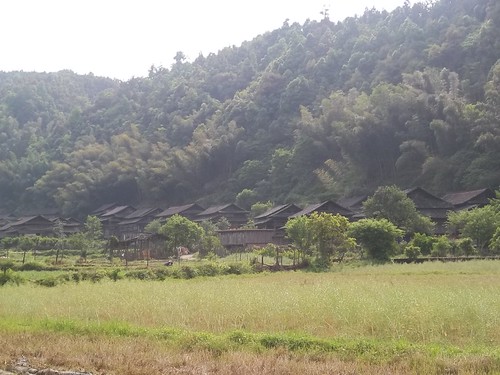
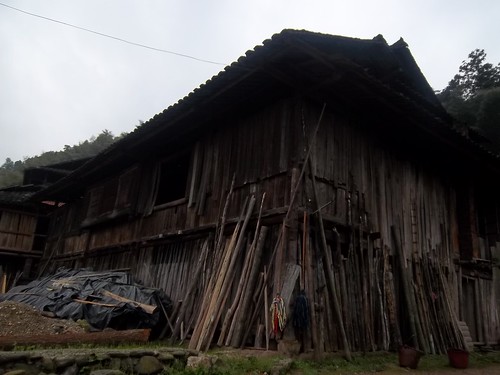

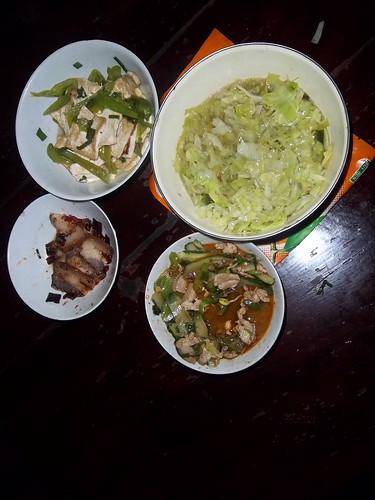


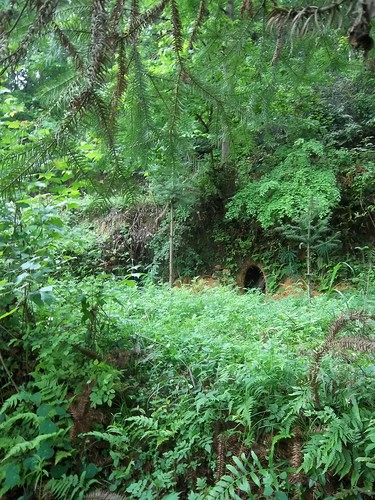



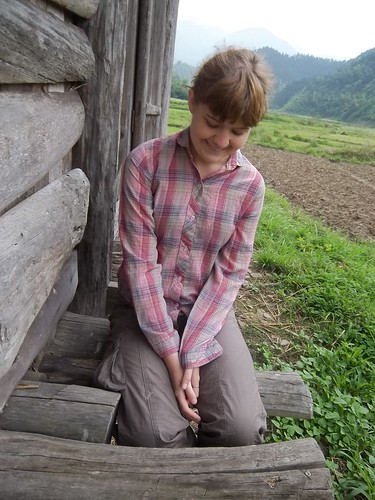
No comments:
Post a Comment